Difference between revisions of "Belfort Village"
CampMaster (talk | contribs) |
CampMaster (talk | contribs) |
||
| Line 6: | Line 6: | ||
|- | |- | ||
|[[File:Photo Belfort Village 002.jpg|196px]] | |[[File:Photo Belfort Village 002.jpg|196px]] | ||
| − | |align="center"|[[File: | + | |align="center"|[[File:Belfort Village 003.jpg|196px]] |
| − | |align="right"|[[File: | + | |align="right"|[[File:Belfort Village 004.jpg|196px]] |
|- | |- | ||
| − | |[[File: | + | |[[File:Belfort Village 005.jpg|196px]] |
|align="center"|[[File:Photo 006.jpg|196px]] | |align="center"|[[File:Photo 006.jpg|196px]] | ||
|align="right"|[[File:Photo 007.jpg|196px]] | |align="right"|[[File:Photo 007.jpg|196px]] | ||
|} | |} | ||
| − | As in many other places in the world, leprosy is a feared disease. Also in Madagascar, people suffering from leprosy are often forced to leave their village community. Even after successful treatment, former lepers are not always welcome back in their village. In 1988, Marie-Hélène KAM HYO Zschocke founded the non-governmental organisation [http://www.calamada.org CALA] to help former leprosy patients socially and professionally reintegrate. Today there are over 100 people living in Belfort Village, half of whom are children. Belfort Village is named in memory of a deceased patient. On the grounds of the village is the | + | As in many other places in the world, leprosy is a feared disease. Also in Madagascar, people suffering from leprosy are often forced to leave their village community. Even after successful treatment, former lepers are not always welcome back in their village. In 1988, Marie-Hélène KAM HYO Zschocke founded the non-governmental organisation [http://www.calamada.org CALA] to help former leprosy patients socially and professionally reintegrate. Today there are over 100 people living in Belfort Village, half of whom are children. Belfort Village is named in memory of a deceased patient. On the grounds of the village is the primary kindergarten Ezaka (meaning "A serious effort") with a canteen and various workshops were villagers can learn profitable activities such as weaving baskets, mats and hats, making jewellery from nuts and seeds, farming or working in the nearby Macolline planting nursery. CALA does not only support the villagers financially or technically, CALA also donates drugs, food and clothes when needed. |
<googlemap version="0.9" lat="-14.85746" lon="50.260915" zoom="18" controls="large"> | <googlemap version="0.9" lat="-14.85746" lon="50.260915" zoom="18" controls="large"> | ||
Revision as of 06:49, 19 October 2014
Belfort Village in Mahevadoany is a so-called leprosy village, located six kilometres outside the town of Antalaha along the road direction Sambava. The village is home to lepers as well as former lepers and their families. Belfort Village is supported by the NGO CALA (Comité d'Aide aux Lépreux d'Antalaha).
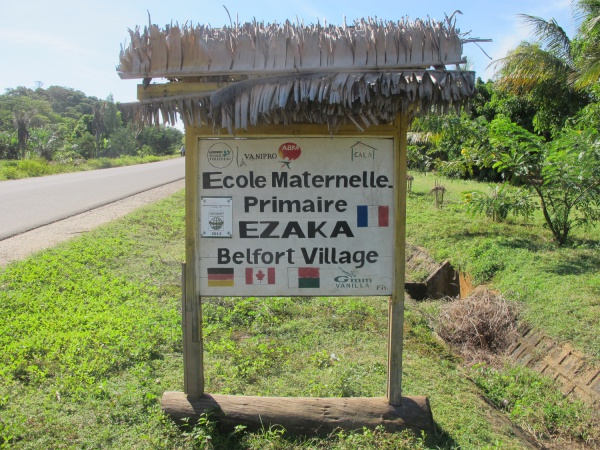
| ||
| 196px | 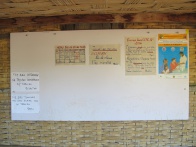
|
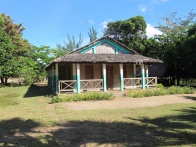
|
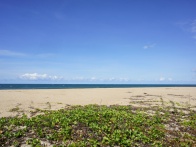
|
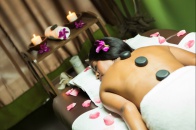
|
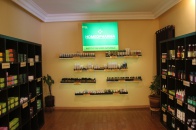
|
As in many other places in the world, leprosy is a feared disease. Also in Madagascar, people suffering from leprosy are often forced to leave their village community. Even after successful treatment, former lepers are not always welcome back in their village. In 1988, Marie-Hélène KAM HYO Zschocke founded the non-governmental organisation CALA to help former leprosy patients socially and professionally reintegrate. Today there are over 100 people living in Belfort Village, half of whom are children. Belfort Village is named in memory of a deceased patient. On the grounds of the village is the primary kindergarten Ezaka (meaning "A serious effort") with a canteen and various workshops were villagers can learn profitable activities such as weaving baskets, mats and hats, making jewellery from nuts and seeds, farming or working in the nearby Macolline planting nursery. CALA does not only support the villagers financially or technically, CALA also donates drugs, food and clothes when needed.
GPS Coordinates
S 14°51.434'
E050°15.600'
18m elevation
Additional Information
- CALA - Comité d'Aide aux Lépreux d'Antalaha or Leprosy Relief Committee of Antalaha
- Leprosy making a comeback in Madagascar - Article in IRIN, 2011